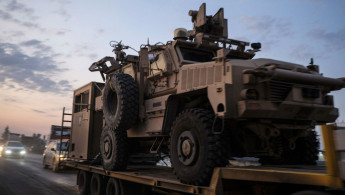US troops exiting Syria to stay 'temporarily' in Iraq, Esper says after backlash
In an interview with CNN, Esper said the US forces were pulling out in phases, and had now moved from the "immediate zone of attack" to a northeastern corridor out of the country.
"Then we'll have another phase that will draw all the forces out. We will temporarily position in Iraq before bringing the troops home. They will be coming home," he said.
Dozens of US armoured vehicles arrived on Monday at a base in Iraqi Kurdistan.
The comments came after Iraq on Tuesday said US forces crossing into the country do not have permission to stay.
The Iraqi military statement appears to contradict the Pentagon, who announced that American troops will be moving to western Iraq on their way out of Syria where 1,000 troops are expected to continue their campaign against the Islamic State group in the country.
Speaking to reporters at Prince Sultan Air Base in Saudi Arabia, Esper said he'll have a discussion with the Iraqi defence minister on Wednesday.
Twitter Post
|
Asked about US President Donald Trump's comment on Monday that a small number of soldiers were being deployed to secure oilfields in Syria, Esper said that was still under discussion.
"But that needs to be worked out in time. The president hasn't approved that yet," he said.
"With regard to deployment, my aim is to keep my options open - really, the president's options open - so if events change on the ground in Syria or other parts that we have the flexibility to respond to the president's position," he added.
Read more: Is Trump really bringing US troops home?
President Donald Trump ordered the bulk of US troops in Syria to withdraw after Turkish President Recep Tayyip Erdogan made it clear in a phone call that his forces were about to invade Syria to push back Syrian Kurdish fighters whom Turkey considers terrorists.
The pullout largely abandons the Syrian Kurdish allies who have fought the Islamic State group alongside US troops for several years. Between 200 and 300 US troops will remain at the southern Syrian outpost of Al-Tanf.
Angered at feeling betrayed, some residents in areas populated predominantly by Kurds in both Syria and Iraq have pelted the withdrawing troops. On Monday, a US convoy that was driving down an avenue in the Kurdish-dominated city of Qamishly was pelted with potatoes.
"Like rats, America is running away," one man shouted in Arabic at the vehicles.
Twitter Post
|
Near the Iraqi city of Erbil, a small group of young men threw stones at a convoy of US armored vehicles, shouting obscenities as it drove down a main highway, according to a video circulating online.
In a statement, the Iraqi Kurdish regional government said the positive role played by US-led coalition forces in northern Iraq, protecting and assisting its residents, should not be confused with an "unpopular political decision" that has been taken — a reference to Trump's sudden move to withdraw troops from Syria.
Esper echoed Trump in defending the abandonment of the Kurdish fighters who bore the brunt of the US-led campaign against the Islamic State (IS) group in Syria.
They were forced to flee from cities they controlled in Syria in the face of a Turkish offensive against them.
He said Washington opposed the Turkish invasion, but: "We are not going to war against a NATO ally and certainly not... with regard to a border that we didn't sign up to defend in the first place."
The United States currently has 5,200 troops in Iraq, part of a US-led international coalition against IS.
Their presence at several bases in Iraq has been the subject of debate there, with pro-Iranian Shia militias and politicians making frequent demands for their withdrawal.
Follow us on Twitter: @The_NewArab





 Follow the Middle East's top stories in English at The New Arab on Google News
Follow the Middle East's top stories in English at The New Arab on Google News


